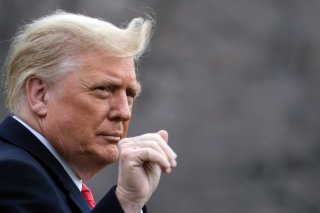When Is Donald Trump Going to Get His Coronavirus Vaccination?
While health-care workers received and gave the first vaccines last week, Trump stayed silent and instead, stood laser-focused on overturning the presidential election results, even after Biden credited the Trump administration for their work during the public health crisis, saying it “deserves some credit getting this off the ground with Operation Warp Speed.”
President-elect Joe Biden received the first dose of the coronavirus vaccine on live television Monday afternoon, signaling to Americans that it is safe and reiterating his urges to trust scientists in handling the deadly disease.
Vice President Mike Pence was also inoculated against the virus on Friday, along with other lawmakers including House Speaker Nancy Pelosi (D-Calif.) and Senate Majority Leader Mitch McConnell (R-Ky.), all efforts to ensure safety in getting the vaccine and persuade Americans to get their own. Vice President-elect Kamala Harris and her husband, Doug Emhoff, are expected to receive their vaccines next week.
“I am doing this to demonstrate that people should be prepared when it is available to take the vaccine,” Biden said after getting the Pfizer-BioNTech COVID-19 vaccine at a Delaware hospital. Jill Biden, his wife, received her shot earlier. “There is nothing to worry about,” he said.
But while the president-elect and top lawmakers received the first dose of the vaccine, President Donald Trump has remained largely out of sight during the country’s first vaccine rollout, at a time when he could be capitalizing on a historic moment for the country as it’s struggled to climb out of the seething pandemic. While health-care workers received and gave the first vaccines last week, Trump stayed silent and instead, stood laser-focused on overturning the presidential election results, even after Biden credited the Trump administration for their work during the public health crisis, saying it “deserves some credit getting this off the ground with Operation Warp Speed.”
During the pandemic, the president also undercut the White House’s public health experts who have offered guidance in vaccine development and distribution plans. But Trump’s tactics in bashing certain scientists have backfired, as several Americans report distrust in taking the vaccine.
About a quarter of Americans said they will “definitely not” get the coronavirus vaccine and more than 25 percent of Republicans say they will never get it, according to polls released last week.
In recent months, Trump has supported these anti-vaccine sentiments, while simultaneously boasting about his administration’s efforts in building a speedy development of the vaccine.
“My administration cut through every piece of red tape to achieve the fastest-ever, by far, launch of a vaccine trial for this new virus, this very vicious virus,” the president said at a Rose Garden event in May.
Trump also targeted Biden and Harris on the campaign trail, saying that the Democratic duo had “reckless anti-vaccine rhetoric” that “undermines science, and what happens is all of the sudden you’ll have this incredible vaccine and because of that fake rhetoric, it’s a political rhetoric . . . that's all that is.”
The president did, however, break the silence amid states receiving initial shipments of the vaccine on Tuesday when he took to Twitter, noting that “Distribution of both vaccines is going very smoothly. Amazing how many people are being vaccinated, record numbers.” But he has not indicated if or when he will get the vaccine.
Surgeon General Jerome Adams noted over the weekend that Trump has not been injected with the vaccine since he was hospitalized with the infection in October, where he was thoroughly treated with monoclonal antibodies. A Centers for Disease Control and Prevention committee also suggested that patients who received that type of medical care should wait at least ninety days for a vaccination.
Rachel Bucchino is a reporter at the National Interest. Her work has appeared in The Washington Post, U.S. News & World Report and The Hill.
Image: Reuters

